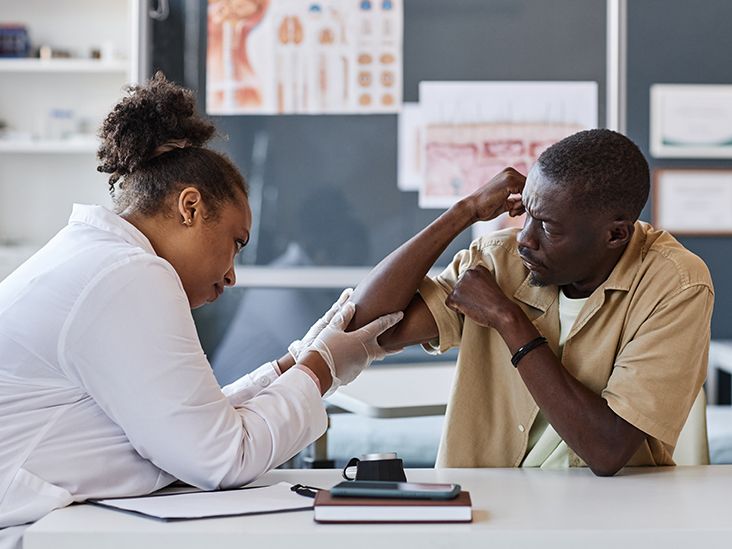Eczema is a chronic condition that causes dry, itchy skin. Scratching the affected skin may cause more irritation, swelling, and discoloration. Your skin may also crack, bleed, or weep clear fluid.
The most common type of eczema is atopic dermatitis. It may affect different parts of your body, such as your face, neck, hands, elbows, knees, and feet. Less commonly, symptoms may develop around your genitals.
A 2021 research review found atopic dermatitis can negatively affect quality of life and self-esteem. You might feel self-conscious about visible symptoms or scratching itchy skin. You might also face stigma from others.
These challenges may limit your self-confidence and contribute to symptoms of anxiety and depression.
Taking steps to manage your symptoms and build self-worth is important for improving self-esteem.
You might also find it helpful to connect with a mental health professional, who can help you develop strategies to cope with the social, emotional, and psychological challenges of living with this condition.
Getting treatment for atopic dermatitis can reduce itching, discomfort, and visible skin symptoms, which may help improve your self-confidence and well-being.
Your doctor may prescribe one or more of the following treatments:
- changes to your lifestyle habits, including your skin care routine
- topical therapy, such as medicated ointment, cream, or lotion
- oral or injectable medication
- light therapy
It’s also important to limit any triggers that may worsen your symptoms. Triggers vary from one person to another. Your doctor can help you identify and manage potential triggers.
Let your doctor know if you have concerns about your symptoms or treatment. They might recommend changes to your treatment plan or lifestyle habits.
It’s important to discuss your treatment preferences and priorities with your doctor.
For example, some people who use topical therapies prefer creams or lotions to ointments.
“For many topical medications and moisturizers, ointment tends to be more effective — but creams are less visually noticeable on the skin, and there’s less staining of clothing, so patients may be more comfortable and confident using a topical therapy that’s a cream,” Jonathan Silverberg, MD, PhD, MPH, told Healthline.
Silverberg is a professor of dermatology and director of clinical research at George Washington University School of Medicine and Health Sciences in Washington, DC.
“Adjusting the timing of topical therapy can also be helpful if it’s messy and affecting someone’s body image. We can time the application to be at night or when patients are not going out,” he says.
Developing a gentle skin care routine is important for not only reducing symptoms of atopic dermatitis but also promoting the overall health of your skin. Proper skin care may decrease blemishes and improve the appearance of your skin, which may boost your self-confidence.
For a gentle skin care routine, try the following:
- Use skin care products free of fragrances, dyes, and other common irritants.
- Wash your skin with cool or lukewarm water.
- Avoid taking long, hot baths or showers.
- Pat your skin dry rather than rubbing it.
- Moisturize your skin regularly.
Using makeup on skin that’s affected by atopic dermatitis can potentially trigger worse symptoms.
If you’re going to use makeup, look for products formulated for sensitive skin. Avoid or limit products that contain common irritants, such as fragrance and glitter. Before using a new product, check the ingredient list and consider testing it on a small patch of skin.
Use clean fingertips or clean, soft applicators to apply the makeup. Always remove it before you go to bed, using a gentle soap or cleanser. Makeup removal products that contain alcohol may irritate your skin.
Following your treatment plan, practicing good skin care, and developing other strategies to manage atopic dermatitis may reduce your symptoms and help you feel more in control of the condition. This may help improve your self-confidence.
It’s also important to foster a sense of self-worth beyond atopic dermatitis.
Here are some strategies that might help:
- Make a list of your strengths, skills, and other positive attributes.
- Consciously reflect on the positive contributions you make to your community, including things you’ve done to help family members, friends, and others.
- Carve out time to explore different interests, participate in fun activities, and build on your strengths and skills.
Strengthening your social network and spending time with people you care about may also help.
According to a 2019 research review, positive social relationships and social support may improve self-esteem. In turn, better self-esteem may benefit your relationships.
Talking with trusted friends or family members about the challenges you’re facing may help you build a sense of connection and social support.
You might also find connecting with other people with atopic dermatitis helpful. For example, consider asking your doctor if they know about any support groups or contact others through social media. You can share your experiences and tips for managing the condition with each other.
Connecting with a mental health professional may also help you manage body image concerns and related challenges. They can help you develop coping strategies to manage these concerns.
A
If you think you might have symptoms of anxiety, depression, or another mental health condition, let your doctor know. They may recommend treatments to manage atopic dermatitis and address mental health symptoms.
Atopic dermatitis can cause uncomfortable symptoms and visible skin changes that may negatively affect your quality of life, body image, and self-esteem. This may contribute to symptoms of anxiety and depression.
Getting treatment can help manage symptoms of atopic dermatitis, which may limit their negative effects on your sense of self and mental health. You might need to try multiple treatments to find what works for you.
Making an effort to recognize and build your strengths and skills may also help improve your self-confidence. Atopic dermatitis doesn’t have to define who you are as a person.
Reaching out to others for support is important, too. You might find it helpful to talk with friends and family members, join a support group, or connect with a mental health professional.











